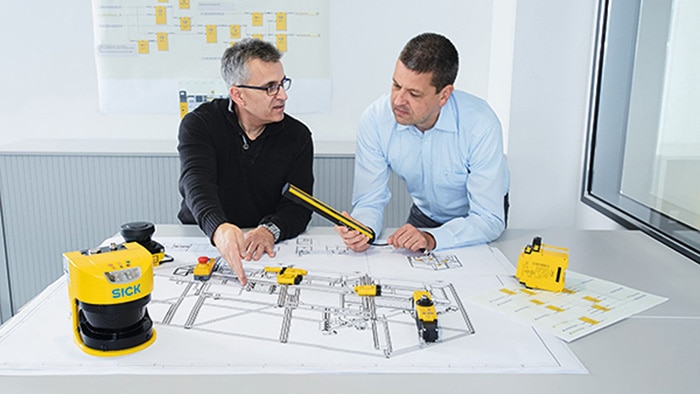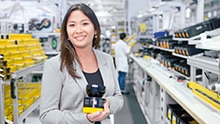Already in the development and design phase of a machine, consideration must be given to how its safety can be ensured. This is because accidents are often the result of inadequate prior risk assessments. Residual risks can be reduced by installing additional safety technology during implementation and commissioning. Machine safety depends critically on the proper functioning of the safety system and other risk-reducing measures. Occupational safety must also be ensured at all times during operation however. Functional safety plays an important role during each of these phases and requires appropriate knowledge on the part of technically responsible persons.
SICK offers further training as a Certified Functional Safety Expert - SGS-TÜV Saar (CFSAE) and Certified Functional Safety Technician - SGS-TÜV Saar (CFSAT). Developers, designers, integrators, technicians and operators can learn more about functional safety and how to ensure machine safety.
SICK is a certified cooperation partner of SGS-TÜV Saar for the functional safety training program. The qualified SICK trainers listed by SGS-TÜV Saar are experts who possess comprehensive theoretical and practical knowledge. Many years of project experience, continuous training in the field of functional safety, and didactic skills characterize the competence of SICK's training personnel. The training courses enable engineers, designers, technicians and other interested parties from relevant fields to become internationally recognized experts or technicians in functional safety and to deepen their specialist knowledge. Training is provided at a SICK subsidiary, on-site at the customer's location, or online and is currently available in English, Spanish, Turkish, and Chinese. This also enables companies in other regions of the world to acquire knowledge about the safety-related requirements and guidelines of the European Union and simplify the export of their goods and commodities.
A comprehensive agenda
SICK's CFSAE expert training covers the complex topics of risk assessment and reduction, machine safety, and functional safety on machines. Various protective devices such as protective light grids and electrosensitive protective devices, as well as safety-related software that can be used to mitigate risks, will be presented. Another topic area deals with the possible installation locations of protective devices. As well as this, participants learn about requirements for developing safety-related control systems, including principles for verifying and validating safety functions, on the basis of the following standards: EN ISO 12100 (Safety of machinery – General principles for design – Risk assessment and risk reduction), EN ISO 13849 (Safety of machinery – Safety-related parts of control systems), and EN/IEC 62061 (Safety of machinery – Functional safety of safety-related electrical/electronic/programmable electronic control systems). SICK trainers work with detailed practical examples and provide tried-and-tested expert tips in areas such as documentation and functional safety management. They also provide support when it comes to implementing the European Work Equipment Directive for manufacturers. Further training content relates to the EN/IEC 61508 standard (Functional safety of electrical/electronic/programmable electronic safety-related systems) and the Machinery Directive.
The SICK Technician Training Course (CFSAT) teaches the importance of basic standards and regulations for machine safety (e.g., ISO 12100, ISO 13849, EU Machinery Directive, EU Work Equipment Directive). In the process, SICK trainers explain why risk assessment and hazard identification are necessary and the methods used to conduct these. Using concrete examples, they show what protective devices are available and what they are used for, general considerations on installing certain protective devices and using them reliably, and why it is so important to install protective devices correctly. Other training topics include recognizing safety-related impairments in machine operators and deficiencies in machine safety, as well as maintaining occupational safety in your daily operations. Safety evaluation and the consequences of machine modifications are also on the curriculum.
Highly qualified with the CFSAE and CFSAT certificates (SGS-TÜV Saar)
Participants receive detailed training materials and can take a final examination if desired. If the examination is passed, SGS-TÜV Saar issues the globally recognized Certified Functional Safety Expert - SGS-TÜV Saar (CFSAE) or Certified Functional Safety Technician - SGS-TÜV Saar (CFSAT) certificate.
Do you have any questions?
The learning offerings at a glance
Certified Functional Safety Application Expert
Certified Functional Safety Application Technician





